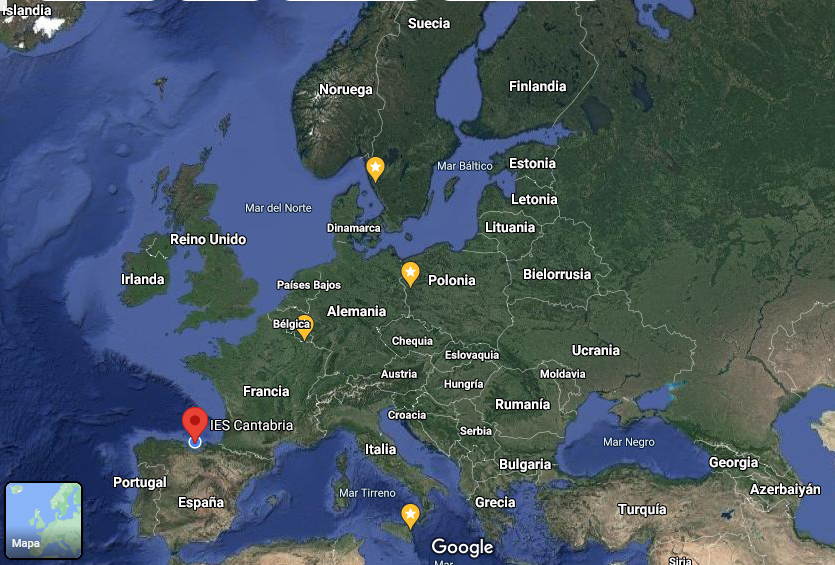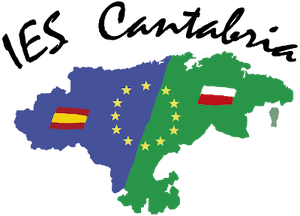Erasmus+ In Contact, In Culture
IES Cantabria
Project n°2020-1-FR01-KA227-SCH-094714
Our school. Presentation:
The IES CANTABRIA is an educational centre which started its activity back in the 90s as a Vocational Training and Secondary & Bachillerato School (Pre-university level) and it is located within the urban area of Santander (https://goo.gl/maps/6BvHXNKmGHMigErx7), a small town on the north coast of Spain: http://en.wikipedia.org/wiki/Santander,_Spain
Our school is a medium-size institution with 1300 students and 118 teachers currently working on the different fields which develop the national curriculum for Secondary Education and specialized courses in the Health and Chemistry fields, as well as different actions aimed at engaging the students’ interests for further education. One of the identity marks of the school is trying to cope with individualised learning. Since 1996, the school has become an outstanding reference in different fields meeting the challenges of education according to the circumstances and it is the only one developing the British Council-Ministry Ed. Bilingual programme.
During the years of compulsory education (ESO), special measures are implemented in order to attain students with Special Needs, Literacy, Bilingualism or those taking part in the Diversified curricula. At the Advanced Levels (Bachillerato), our school offers a wide variety of subjects and professional marketable skills for pupils: Social Sciences and Humanities and Sciences.
Some School Resources: Plans, projects and programmes
There is a library with more than 5000 books and computers with Internet access which can be visited by students and teachers.
A gym and two courts are some of the sports facilities for the students located within the school area which also has gardened surroundings.
ICT is present in most of the classrooms and Internet Wi-Fi access is provided in the main building.
At IES Cantabria Secondary School, there are also specific projects and plans such as Reinforcement, Sustainability, Health Education, Entrepreneurship, European Programmes (eTwinning/Erasmus) Languages and ICT which are jointly developed during the 6 years-stay of pupils aged 12 to 18.
The European dimension and internationalization is a key aspect yet to come, as we are open to collaboration with international partners from other European countries to exchange best practices and develop innovative digital competency and ICT training programmes, methodologies and materials adapted from existing programmes offered at educational institutions around Europe.

The promotion and the implementation of mobility is one of the top priorities of the European Union. Youth mobility has an impact on employability, which is more than relevant for students in high-schools, who are starting to determine and make choice about their future. What’s more, in the context of the Covid-19 crisis, it is important to re-motivate students to be mobile and encouraging youth mobility in Europe:
- by giving some students the opportunity to “move” to another country (via the learning activities)
- but first and foremost by enabling a lot of students to discover the different possibilities of mobility offered during their studies and to get some advice about their future trip. For this, a prerequisite is having knowledge of what Europe is as well as being a European citizen with intercultural competences.

Our project has many assets:
- It has a real European purpose: «to live Europe».
- It enables students and teachers to learn about other cultures, and to develop their intercultural skills.
- Participants discover cultural heritage sites, and learn more about the cultural wealth and diversity of Europe.
- The students’ creative spirit will be put forward.
- Alongside physical mobilities, it will enhance digital contact (via eTwinning).
- It involves many students during the short-term exchanges (and not only teachers).
- The whole school will be impacted by the project – it will be a school project (unlike a class project) as the results will be highly disseminated and all students will be sensitized to European cultural awareness and European mobility.
- Students and teachers will work collaboratively. The learning activities will also permit this work of cooperation.
- The project will not only last 2 years – it will have effects on the medium and long term as it is meant to encourage more students and staff to be mobile in the EU.
Our Erasmus+ project is called “In CC : in Contact, in Culture”.
Beyond the promotion of the linguistic and cultural richness of the European Union, our project stimulates creativity and develop cross-cultural competences. It also aims at remotivating youth mobility in Europe, especially in the context of the Covid-19 crisis.
The project, which will take place from May 2021 to April 2023, will link 5 schools in 5 different European countries: Lycée Alfred Mézières in France, I Liceum Ogólnokształcące im. Adama Mickiewicza w Sulęcinie in Poland, IES Cantabria in Spain, Convitto Nazionale Mario Cutelli in Italy, Klara Teoretiska Gymnasium Vallgatan in Sweden. The language of communication will be English but an introduction to the 5 languages of the countries is also planned so as to enhance plurilingualism too. Our project will reinforce cross-cultural comparison by combining digital contact via eTwinning and physical contact via the learning activities. Our exchange project will thus be hybrid.
A kick-off transnational meeting in Spain, in May 2021, will involve the teachers of the project and will enable them to organize the final details of the project.
Five learning activities will take place, involving short-term exchanges of groups of pupils aged between 15 and 17 years old. Each mobility will gather 32 students, along with 10 teachers:
- in October 2021 in Poland;
- in January 2022 in Spain;
- in April 2022 in Sweden;
- in November 2022 in Sicily;
- in March 2023 in France.
During the learning activities, students will learn more about mobility opportunities via a conference. They will also collaborate and exchange through multinational workshops. Finally, they will develop their European citizenship and will experience a new culture by sharing their cultural backgrounds and their local cultural offer, by sharing their partner’s family life, by learning their partner’s language and cultural reality and by enhancing their knowledge about Europe.
The project will lead to three creative productions:
- The creation of a tool to encourage the mobility: a booklet composed of mobility sheets to present the different possibilities of mobility as well as tips to help preparing the mobility. This tool will be available for all students online on the schools’ website and in a «mobility corner» in each school.
- The organisation of a «Mobility Fair» (an exhibition along with talks) in each school so as to give information and motivation to all the students of the schools and other local schools to take the first step abroad.
- The creation of videos promoting the partners’ country, culture and local cultural heritage.
The objectives of this project are manifold and have different targets:
- for students: higher self-confidence, in English but also on an interpersonal level (development of linguistic and communicational skills) / development of transversal and intercultural
- competences / development of ICT and creative skills / learning about the cultural heritage of each country / better awareness of European citizenship and better knowledge of the European Union.
- for teachers: professional development through new teaching methods and through the discovery of other school systems / discovery of the cultural heritage of each country /development of intercultural and English skills.
- for schools: a stronger dynamic inside the school (thanks to team work) and outside the school (better visibility and attractiveness thanks to the disseminating work).
